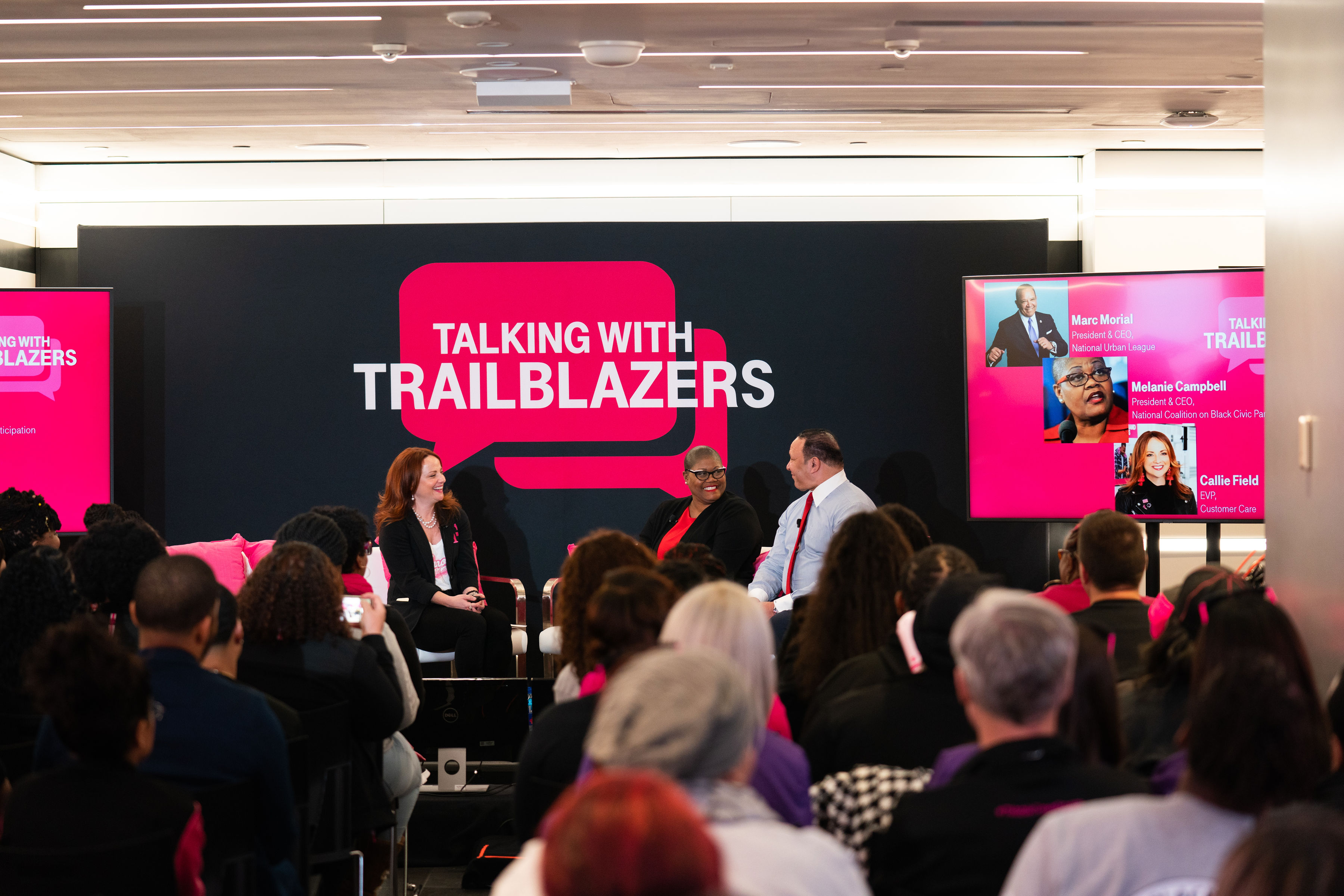The first Talking with Trailblazers of 2020, T-Mobile’s ongoing guest-speaker series — which features some of the brightest, most innovative, creative and diverse leaders from across the country talking about topics that matter — brought a packed house to the T-Mobile Signature Store in New York City’s Times Square. And for good reason — for T-Mobile’s all-employee Black History Month event, the Un-carrier hosted two luminaries of the modern civil rights movement: Marc Morial, CEO of the National Urban League, and Melanie Campbell, president and CEO of the National Coalition on Black Civic Participation. They sat down with Callie Field, T-Mobile’s EVP of Customer Care and new executive sponsor of T-Mobile’s Multicultural Network, to share their thoughts with an audience of diverse Team Magenta members from across the five boroughs, plus hundreds more online.
The national theme for this year's Black History Month is "African Americans and the Vote." With that in mind, Marc and Melanie went deep on the meaning of Black History Month, the reality of racism in America, and the importance of civic engagement at all levels of society. Here, some of the key takeaways from this lively and important Talking with Trailblazers event.
Black History Month is about celebration — and also education.
Marc Morial: “Black History Month centers the history of a people who overcame so much, from the depths of being transferred from another shore on slave ships to hundreds of years of bondage to be incredible influencers that we are today. To some extent, it’s about individual histories, family histories. But it’s more than that — it’s about us. We’re making history, every single day.”
Melanie Campbell: “I’m always excited about Black History Month — and then I get depressed because it’s such a short month! It’s a celebration, but it’s also an opportunity to educate those who come after us. Black people helped build this country — let’s understand that and celebrate that. But also, let’s understand that the civil rights gains weren’t just for black folks. Others were able to benefit from things like the Civil Rights Act and the Fair Housing Act that we fought for.”
Politics is not a spectator sport. Get in the game!
Morial: “Democracy is not a system where you stand on the side and observe. It’s a process that requires and gives us all of us the right to be in the game. Civic engagement demands that we participate in the census and we vote. Because if we do not, somebody else will make decisions for us.”
Campbell: “Own your power! Millennials are the largest voting block out there. We all have a role to play in this election cycle. And sisters, we own the power when it comes to politics in our community. We’re mostly the heads of household. We have the power in our hands!”
It’s up to each of us to fight against racism.
Morial: “Racism is a disease. It was invented by people. It’s not a natural state to judge people by color of skin. It’s a function of system created in the 1300s, 1400s. It has to be combatted. The most important thing that white Americans have to do is confront racism among other white Americans. [Black people] are not in those closed conversations where stereotypes play out. Behavior is learned — and we have to unlearn it. People of good will can’t be afraid to confront people of bad intentions.”
You can be financially successful AND follow your passion for social justice.
Campbell: “I started in corporate America — making money, dressed for success. But I was also engaged in community, and that evolved into where my passion ended up being. I could take that business experience and run an organization. So, I’m trying to dig in every day and make that difference every day and make sure we don’t stay in the past, but we learn from the past.”
In contemporary America, companies that understand the will of the people will thrive.
Morial: “Wayne Gretzky said, ‘I don’t skate to the puck, I skate to where the puck is going.’ Great American companies have to skate to where the people are going. The country is changing in a dramatic way. It’s becoming a tapestry of ethnicities and people, and companies that embrace that in who they employ, promote and contract with, and in how they embrace and respect their customers, are companies that will thrive. T-Mobile’s commitment to diversity provides an opportunity to be a company that skates to where the people are going.”
Black history is important because it points the way forward.
Campbell: “We’re in that historical moment right now where everybody has to pay attention. We’re making history now. T-Mobile is making history now with you all being here. Trailblazing means we’re always learning!”
Stay tuned for more takeaways from T-Mobile’s Talking with Trailblazers series!
